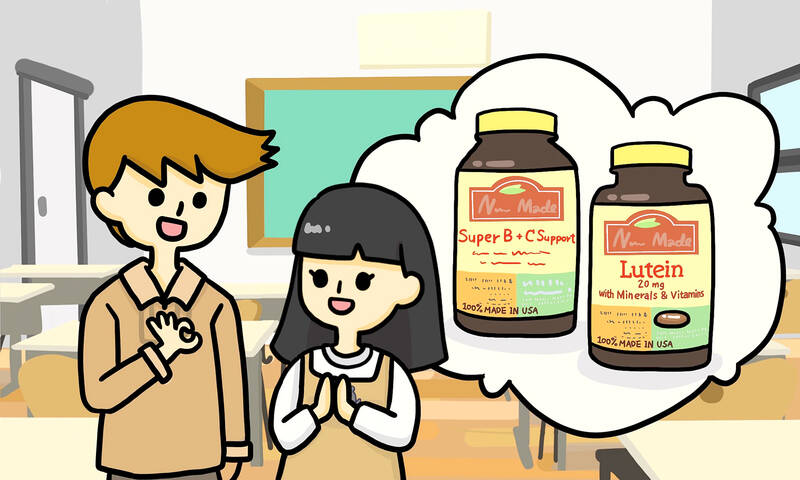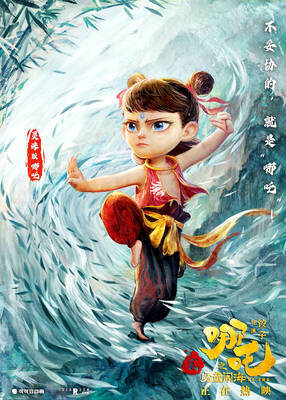對話 Dialogue
小實:馬克,你下個月回美國可以幫我買些東西嗎?
Xiǎoshí: Mǎkè, nǐ xià ge yuè huí Měiguó kěyǐ bāng wǒ mǎixiē dōngxi ma?

馬克:可以啊!你要買「維他命」嗎?
Mǎkè: Kěyǐ a! Nǐ yāomǎi “wéitāmìng” ma?
小實:哈哈,是啊!你怎麼知道我要買維生素?
Xiǎoshí: Haha, shì a! Nǐ zěnme zhīdào wǒ yào mǎi wéishēngsù?
馬克:現在大家很重視健康,所以我常常幫朋友買。
Mǎkè: Xiànzài dàjiā hěn zhòngshì jiànkāng, suǒyǐ wǒ chángcháng bāng péngyǒu mǎi
小實:嗯!在臺灣買這些保健食品都比較貴。
Xiǎoshí: En! Zài Táiwān mǎi zhèxiē bǎojiàn shípǐn dōu bǐjiào guì.
馬克:你只要買維他命嗎?葉黃素要不要?
Mǎkè: Nǐ zhǐyào mǎi wéitāmìng ma? Yèhuángsù yào bùyào?
小實:要要要!現在常常看3C螢幕,一定要保護眼睛。
Xiǎoshí: Yào yào yào! Xiànzài chángcháng kàn 3C yíngmù, yídìng yào bǎohù yǎnjīng.
馬克:不過,這些東西還是比不上真正的食物。
Mǎkè: Búguò, zhèxiē dōngxi háishì bǐ bú shàng zhēnzhèng de shíwù.
小實:平常吃得不夠營養,就只好吃保健食品了!
Xiǎoshí: Píngcháng chī de búgòu yíngyǎng, jiù zhǐhǎo chī bǎojiàn shípǐn le!
翻譯 Translation
Xiaoshi: Mark, can you buy something for me when you return to the United States next month?
Mark: Sure! Do you want to buy “vitamins”?
Xiaoshi: Haha, yes! How did you know I want to buy vitamins?
Mark: Nowadays, everyone pays great attention to health, so I often buy them for my friends.
Xiaoshi: Xiaoshi: Yes! These dietary supplements are relatively expensive in Taiwan.
Mark: Mark: Do you want to buy vitamins only? Do you need lutein as well?
Xiaoshi: Absolutely! We spend too much time staring at screens, so it’s important to protect our eyes.
Mark: Still, it’s not as good as real food.
Xiaoshi: I don’t get enough nutrients from food, so I have to take dietary supplements instead!
單字片語 Vocabulary
1. 維他命(wéitāmìng) vitamin (transliteration)
2. 重視 (zhòngshì) to pay attention to, to value
3. 維生素 (wéishēngsù) vitamin
4. 保健食品 (bǎojiàn shípǐn) health supplements, dietary supplements
5. 葉黃素 (yèhuángsù) lutein
6. 螢幕(yíngmù) screen
7. 保護(bǎohù) to protect
8. 比不上(bǐ bú shàng) not as good as
9. 營養(yíngyǎng) nutritious; nutrition
10. 只好(zhǐhǎo) have no choice but to
教材音檔 Audio Files
教材影片 Video Files:
https://www.instagram.com/celc.nou_tw/guide/_/17999106352646292/
實踐大學華語中心提供
By Shih Chien University Chinese Language Center: https://chineseusc.com/

Microsoft on Feb. 28 announced it was retiring Skype, the online voice and video call pioneer that the tech titan acquired in 2011. “Starting in May 2025, Skype will no longer be available,” said a post from Skype support on X, directing users to sign into Microsoft’s Teams platform for further use of its services. Skype was founded in 2003 by Scandinavians Niklas Zennstrom and Janus Friis in Estonia, revolutionizing Internet communication by offering free voice calls between computers and affordable rates for calls to landlines and mobile phones. Over the years, and as Internet speeds improved, Skype evolved to

A: China’s animated blockbuster “Ne Zha 2” also smashed a box office record recently. B: It’s No. 7 among the world’s best-selling films, grossing more than US$2 billion globally. A: I t has even become the world’s highest-grossing animated film, while the political metaphors in it are causing controversy. B: But who is Ne Zha anyway? A: Ne Zha, often spelled as “Nezha,” is actually a mythical teenage deity with superpowers. A: 中國動畫片《哪吒2》最近也打破紀錄。 B: 該片已衝上影史票房排行榜第7名,全球狂賣超過20億美元。 A: 聽說它甚至是全球最賣座的動畫片,影片中的政治隱喻卻引爆爭議! B: 但哪吒是誰? A: 哪吒的名字常被拼成「Nezha」,是神話中具有超能力的青少年神明。

People desire a sense of purpose in their lives, but they often remain idle unless they have a clear reason to act. This concept is illustrated by the retirement paradox. People work hard to prepare for a future without work but find life meaningless after achieving that goal. A study was carried out to determine if a reason, even a minor one, could encourage idle people to take action. __1__ Upon finishing the first, they were instructed to drop it off at a location either right outside the room or at a spot farther away, which would take around

Continued from yesterday(延續自昨日) https://www.taipeitimes.com/News/lang Results showed that only 32 percent were willing to walk farther for the same candy, but 59 percent chose to do so when promised different candy. Researchers also discovered that students who walked farther reported feeling happier during the wait. __3__ Idleness aversion can be applied in various settings. For example, Uber uses animations and real-time updates to keep customers from being bored while waiting. It can also be used in the design of office buildings to reduce elevator traffic. During busy times, it takes a while to wait for an elevator. __4__ Recognizing the power